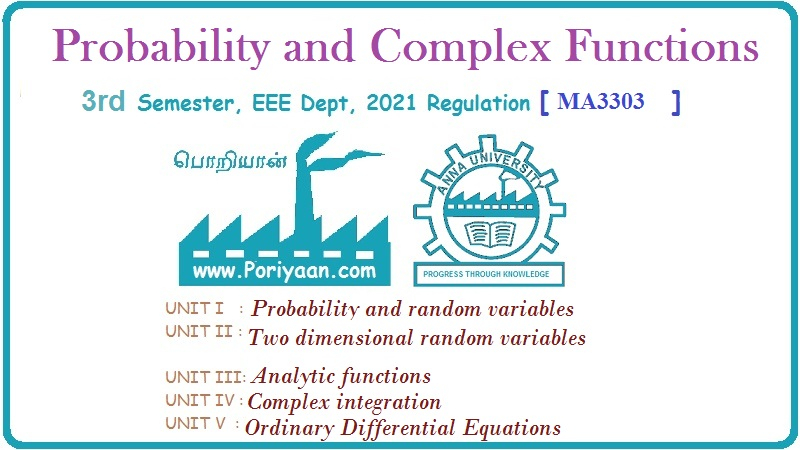Probability and complex function: Unit III: Analytic functions
Example Solved Problems based on Properties harmonic conjugates
Analytic functions
As u and v are harmonic, their first partial derivatives are continuous. They satisfy C-R conditions also, by the definition of harmonic conjugate.
PROBLEMS
BASED ON PROPERTIES
B.W.(1) If f (z) = u + iv is a
regular function of z in a domain D, then  A.U May 1997, Dec.
1997, Nov. 2001, Nov. 96, A/M 2008, May 2001, M/J 2012, N/D 2014, M/J 2016 R-8,
M/J 2016 R-13, A/M 2017 R-08, April 2016 R-15 U.D, April 2017 R-15 U.D
A.U May 1997, Dec.
1997, Nov. 2001, Nov. 96, A/M 2008, May 2001, M/J 2012, N/D 2014, M/J 2016 R-8,
M/J 2016 R-13, A/M 2017 R-08, April 2016 R-15 U.D, April 2017 R-15 U.D
Solution:
Given: f(z) = u + iv

Note :
f (z) = u + iv; f' (z) = ux + ivx;
(or) 
B.W. (2) If f(z) = u+ iv is a
regular function of z in a domain D, then ![]() log |f(z) | = 0 if f (z) f' (z) ≠ 0 in D.
i.e., log | f (z) | is harmonic in D. [A.U A/M 2017 R-13] [A.U A/M 2019 R-08]
log |f(z) | = 0 if f (z) f' (z) ≠ 0 in D.
i.e., log | f (z) | is harmonic in D. [A.U A/M 2017 R-13] [A.U A/M 2019 R-08]
Solution: Given:
f(z) = u + iv
|f(z)
| = √u2 + y2
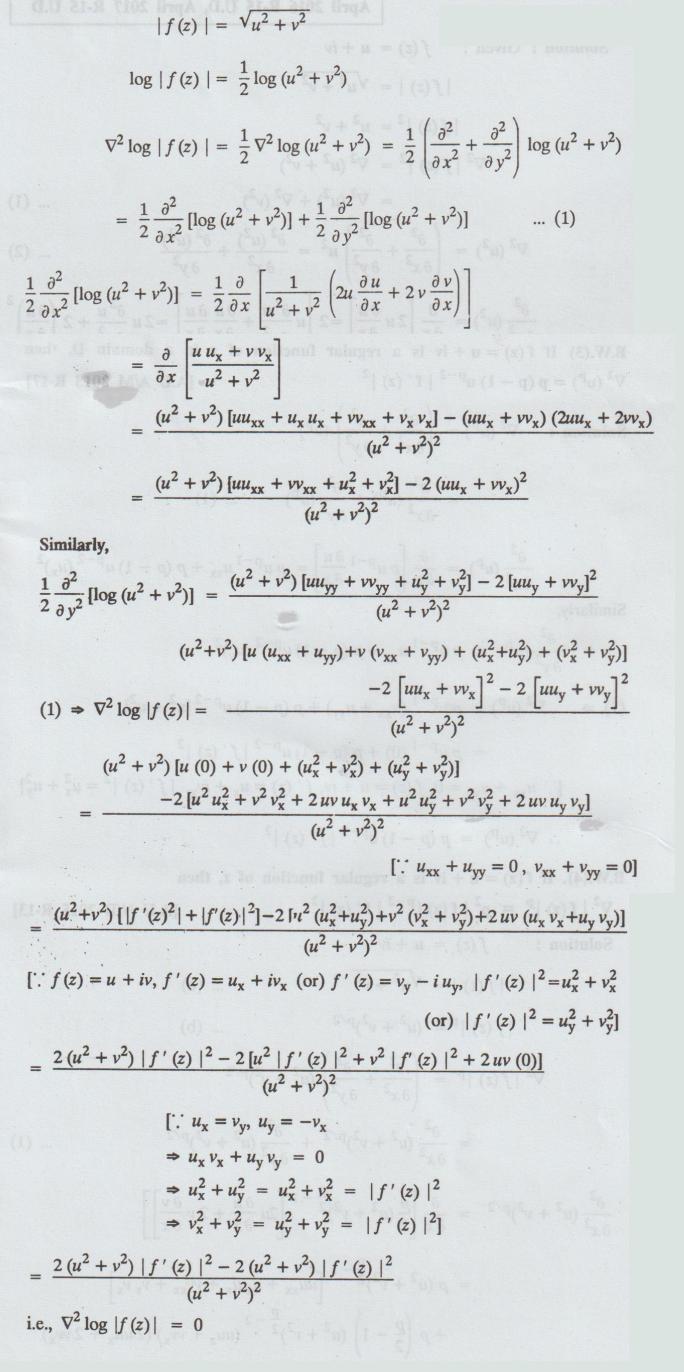
B.W. (3) If f(z) = u+ iv is a
regular function of z in a domain D, then  [A.U
A/M 2018 R-17]
[A.U
A/M 2018 R-17]
Solution:
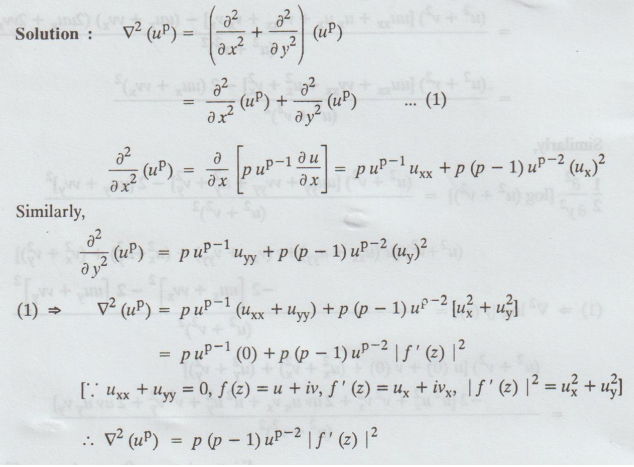
B.W. (4). If f (z) = u + iv is a
regular function of z, then  [A.U N/D 2015 R-13]
[A.U N/D 2015 R-13]
Solution : f(z) = u + iv
|f(z)
| = √u2 + y2 ......(a)
|ƒ
(z) |p = (u2 + v2)p/2 ......(b)

B.W. (5) If f (z) = u + iv is a
regular function of z, then  [arg f (z)] = 0, i.e., arg f(z) is
harmonic in D.
[arg f (z)] = 0, i.e., arg f(z) is
harmonic in D.
Solution :
arg
f(z) = tan -1(v/u)
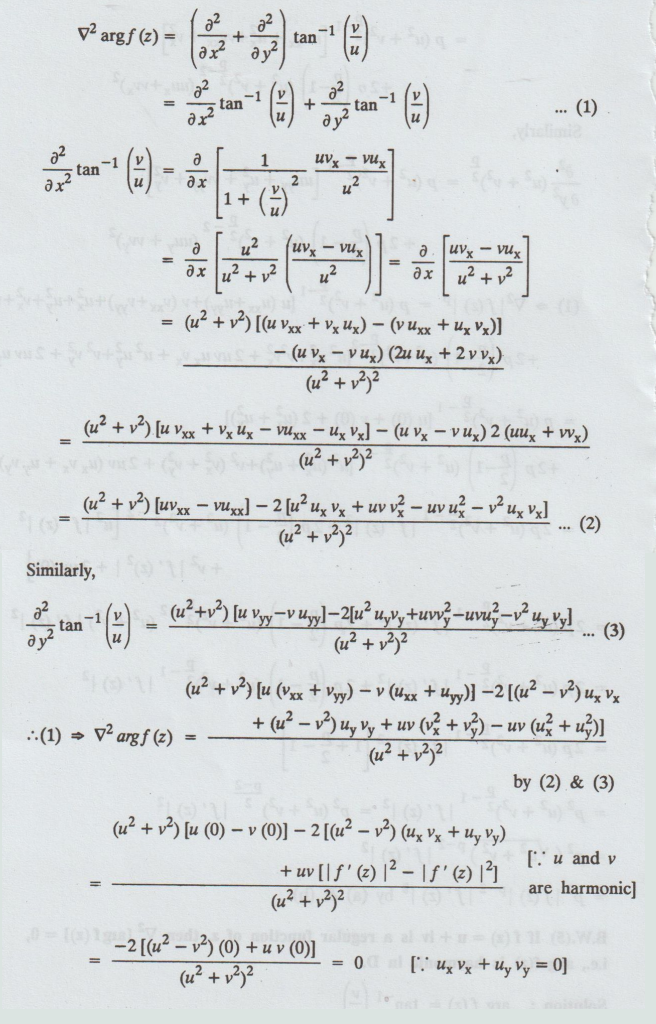
B.W. (6) If f (z) = u + iv is a
regular function of z in a domain D, then  [A.U A/M 2015 R8]
[A.U A/M 2015 R8]
Solution : Given:
f(z) = u + iv
|f(z)
| = √u2 + i2
∂/∂x
|f(z) | = ∂ /∂ x [√u2 + v2 ]
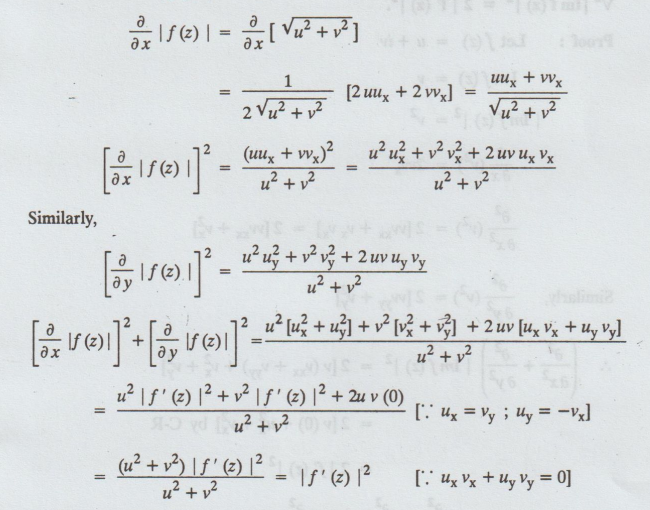
B.W. (7) If f (z) = u + iv is a
regular function of z, then
Solution :
f(z) = u + iv
Re
f(z) = u
|
Ref (z) |2 = u2

=
( ∂2/∂x2 + ∂2/∂y2) (u2)
=
∂2/∂x2(u2) + ∂2/∂y2(u2)
.....(1)
See
Book Work 1. Page No. 3.29
=
2[ u2x + u2y ]
=
2 f'| (z) |2
B.W. (8) If f(z) = u + iv is a
regular function of z, then prove that  | Im f (z) |2 = 2 | f' (z) |2.
| Im f (z) |2 = 2 | f' (z) |2.
Proof :
Let
f (z) = u + iv
Imf(z)
= v
|
Im f (z) |2 = v2
∂/∂x
(v2) = 2vvx
∂2/∂x2
(v2) = 2 [ vvxx + vxvx ] = 2
[ vvxx + v2x ]
Similarly,
∂2/∂y2 = 2 [vvyy + v2y ]
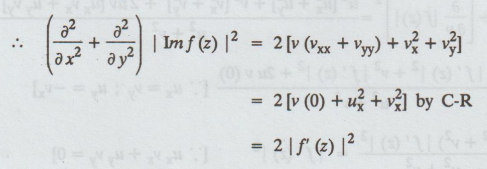
B.W. (9) Show that ∂2/∂x2
+ ∂2/∂y2 = 4 ∂2/∂z∂ 
Proof: Let
f be a function of x and y
where
x & y are functions of z and ![]()
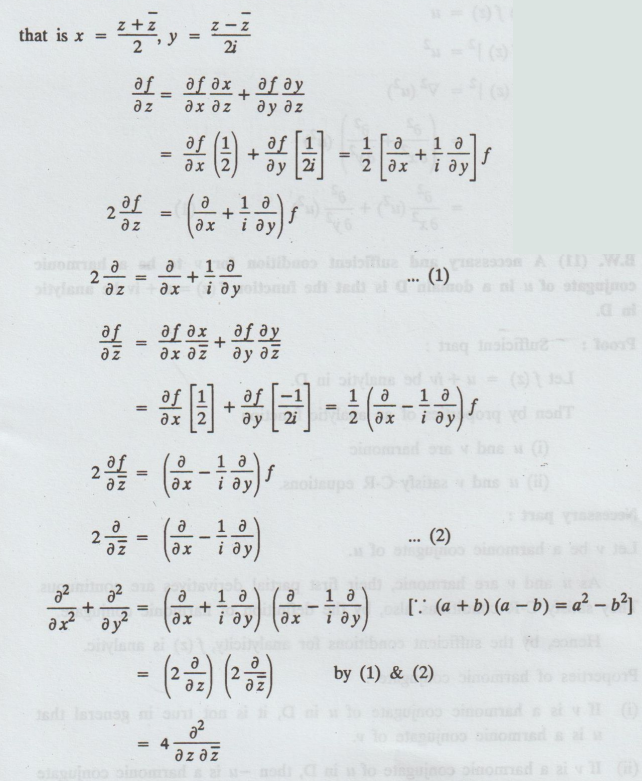
B.W. (10) If f (z) is analytic,
show that 
Solution:
Second method: See first method in Page No. 3.29
We
know that,

B.W. (11) A necessary and
sufficient condition for v to be a harmonic conjugate of u in a domain D is
that the function f(z) = u + iv be analytic in D.
Proof : Sufficient
part :
Let
f (z) = u + iv be analytic in D.
Then
by properties of an analytic function
(i)
u and v are harmonic
(ii)
u and v satisfy C-R equations.
Necessary part :
Let
v be a harmonic conjugate of u.
As
u and v are harmonic, their first partial derivatives are continuous. They
satisfy C-R conditions also, by the definition of harmonic conjugate.
Hence,
by the sufficient conditions for analyticity, f (z) is analytic.
Properties
of harmonic conjugate :
(i)
If v is a harmonic conjugate of u in D, it is not true in general that u is a
harmonic conjugate of v.
(ii)
If v is a harmonic conjugate of u in D, then -u is a harmonic conjugate of v in
D and conversely.
(iii)
If u and v are to be harmonic conjugates of each other, then both u and v must
be constant functions.
(iv)
If u is a harmonic function in a simply connected domain D, then it has a
harmonic conjugate there.
(v)
A harmonic conjugate when it exists, is unique except for an additive constant.
Probability and complex function: Unit III: Analytic functions : Tag: : Analytic functions - Example Solved Problems based on Properties harmonic conjugates
Related Topics
Related Subjects
Probability and complex function
MA3303 3rd Semester EEE Dept | 2021 Regulation | 3rd Semester EEE Dept 2021 Regulation
